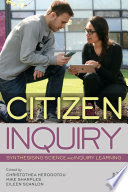Colleagues and I have recently had a chapter published in an edited collection (Curtis et al., 2017).
Led by Dr Vickie Curtis, and reporting findings from her PhD thesis (Curtis, 2015), this chapter explores processes of learning within online citizen science projects.
In particular, the chapter presents evidence as to why citizen scientists register on projects, but also, crucially, what makes them stay and become productive members of a distributed research project.
Social technologies in use
In the chapter we argue that digital technologies are profoundly social in use. They are developed and defined by participants who learn through iterative processes of participation.
This is the case with online citizen science projects. Typically, scientists propose a way of conducting their research in a distributed fashion. They seek out experts in information and communication technologies, and sometimes the citizens they wish to engage with, to work collaboratively in producing and testing a distributed, online research project.
It is through this process of iterative collaborative design that these participants both learn from each other and through the development and use of technology.

Online citizen science (Herodotou, Sharples, and Scanlon, 2017)
But the learning does not end there. Once the online citizen science project is launched, citizens will need to be recruited and trained in how to conduct the project task, use and potentially further develop the technology and in some projects, interact with other participants in the activity.
In some instances, this learning extends to include the governance of the project as a whole. Participants in citizen science not only learn about the science, but also the norms, conventions, rules, and technologies of a given project.
It follows that an understanding of how stakeholders (citizens, scientists, designers, etc.) learn through their engagement with citizen science projects can inform how these projects evolve. Importantly, this evidence can also help to support how new initiatives are designed as productive activities for all participants.
Reference
Curtis, V., Holliman, R., Jones, A. and Scanlon, E. (2017). ‘Online citizen science: participation, motivation, and opportunities for informal learning’, in Sharples, M., Herotodou, C. and Scanlon, E. (eds.) Citizen Inquiry: Synthesising Science and Inquiry Learning. Routledge, Abingdon. Available from: http://oro.open.ac.uk/51075.
Acknowledgement
This research was funded by the Institute of Educational Technology at the Open University (United Kingdom).

